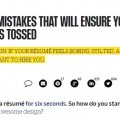
Everyday Career Advice: Using Numbers to Manage Job Search Stress
By Kurt Schmidt In Blog, Everyday Career Advice On April 9, 2017
It’s Monday and I’m supposed to have written and published a blog post already (or more than one – and have them queued up to publish) but I’m still working on it. I procrastinated through my coffee this morning. I took a little longer than necessary to read the news and got distracted a couple of times by flashy things on the internet. Then, worse, I went and had an early lunch with a friend and sat in the sunshine. That precipitated a midday malaise and now, here I am, in the early afternoon still trying to squeak out a blog post (in addition to a bunch of other things that need doing as well).
I know what I’ve been meaning to write about too – it’s something from the book of course, but it’s prescient as well, both for myself, job seekers and a lot of other people starting out their week. The topic is persistence and how to continue to push through difficult times. The idea came after reading a career oriented article in Fast Company, another one of their “list” articles which I guess are very popular. This one is called the “8 Personality Traits of People Who Don’t Let Job Hunting Crush Their Souls” and it goes on to discuss things like staying positive, having goals, being persistent and prepared, networking and continually improving. However the first thing I thought of after reading the headline and scanning the article was “What if someone doesn’t have 1 or more of the 8 on their list?” What I’m really thinking is that “personality traits” might have some influence over success or failure during a job search but it all sounds a bit soft really.
As you know, I wrote a book and recently published it on Amazon. It’s a good book, people have told me – and I agree, however I still have to keep my day job. During the day I’m an executive recruiter. As I wrote in the book, an executive recruiter’s job is a lot like a job seeker’s purpose. I actively seek jobs to work on and fill all the time. It can be a tough and grueling kind of thing, as again, any job seeker knows. I’ve been a headhunter for a long time so I’ve developed a way to deal with it and, referring to the Fast Company article, in contrast to “personality traits,” my method has a lot more to do with being task oriented, completing tactical goals and taking satisfaction from hitting milestones regularly.
It’s all about numbers and managing expectations. I am thinking about this now as I am starting to market a couple of candidates (just like any job seeker should do). The first part is imagining the scale of my goal – I want to earn a good size fee. It’s a big goal, not as big as getting a job for yourself, but still very significant. I know from experience that a goal this big will take some work; in fact, sometimes months of work. Accepting that from the beginning helps me deal with a lot of days in which little will seem to happen.
The next step is understanding and owning the process – for me that means identifying potential clients with the right needs (finding jobs), contacting hiring managers, establishing dialogues, referring candidates, setting up interviews, and so on. As it is with any job seeker, this is a process of elimination. Out of hundreds of attempts, few initial contacts will turn into dialogues, even fewer will result in interviews and of those, maybe just a couple will develop into offers. This is also helpful to know and digest. Processes of elimination are easy – all you have to do is work until you find the solution.
The final step, and maybe the most important, is combining the expectation and acceptance in the first step with the process understanding in the second step into a map that breaks down the overall goal into manageable tasks in specific periods of time. For example, if I accept that making a placement will take three months, that means I have around 90 days. I know from experience (this is one of those “your numbers may vary” types of things but stay with me)… I know from experience that if I call or email 20 or so specific people per day to market a candidate over a few weeks I will find jobs. That’s my first task – find and contact 20 very specific people per day. Next, I know that if I find between 8-10 jobs, at least 3-4 of them will be viable for the candidate(s) I’m marketing and that of those, 2-3 will convert into dialogues or interviews. So I want to find between 8-10 jobs. Next, I know that if I can setup 2-3 high quality interviews then I have a very good chance of getting a good offer for one of my candidates and likely making a placement. So the target minimum is 3 interviews.
My tasks and targets give me smaller goals within my overall goal that allow me to take satisfaction along the way. There’s no personality trait involved in making sure I contact 20 people per day. However hitting the targets, no matter the result, is satisfying.
Where do all of my numbers come from? My numbers come from my experience – but the secret is, they don’t matter. As a job seeker you probably don’t keep historical data that shows calls or emails to interview or offer ratios. Recruiters do but again, the specifics don’t matter that much. What matters is acknowledging that overall success is achieved by meeting a series of targets along the way, defining them and taking satisfaction from putting in a good day’s work to meet them – every day. A successful job search, or a placement for me, is the result of a cumulative effort, not a single action.
I wrote a whole book about this because there’s a lot more involved than just hitting the numbers, however, in regard to the article that prompted the thought, “personality traits” aren’t what get people jobs. Quality, work, and persistence are what get people jobs. The numbers part in the book, that’s Chapter 5, which means there are 4 Chapters before it that fill in the blanks about how to perform the daily tasks in ways that inspire confidence and do even more to get through the tough times.








